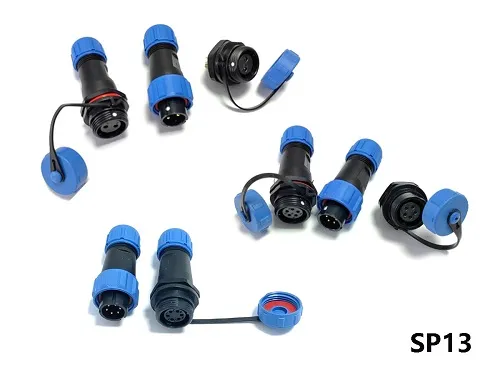How to Choose the Right IP68 Connector for Your Project
2024-08-22
Choosing the right connector for your project can be a daunting task, especially when you're dealing with environments that require waterproof and dustproof solutions. IP68 connectors are designed to meet these challenges, but with so many options available, how do you ensure you're picking the right one? This blog will guide you through the key factors to consider when selecting an IP68 connector for your next project.

1. Understand Your Application Requirements
Before diving into the technical specifications, it's essential to understand the environment in which your connector will be used. Consider the following:
- Exposure to water and dust: How often will the connector be exposed to water or dust? Will it be submerged, and if so, to what depth and for how long?
- Temperature range: What temperatures will the connector need to withstand? Extreme heat or cold can affect the materials used in the connector.
- Mechanical stress: Will the connector be subject to vibrations, impacts, or other forms of mechanical stress?
Having a clear understanding of these factors will help you narrow down your options.
2. Check the Material Composition
IP68 connectors are made from various materials, each suited for different environments:
- Plastic: Lightweight and cost-effective, plastic connectors are suitable for general-purpose applications where chemical resistance is not a primary concern.
- Metal: Connectors made from metals like stainless steel offer superior durability and are ideal for harsh environments, such as marine or industrial settings.
- Composite: Some connectors use a combination of materials to balance weight, cost, and durability.
Choose the material that best matches the demands of your application.
3. Evaluate the Electrical Specifications
The electrical specifications of the connector are crucial to ensure it meets your project requirements:
- Voltage and Current Rating: Ensure the connector can handle the voltage and current levels of your application without risk of overheating or failure.
- Contact Resistance: Low contact resistance is essential for maintaining a reliable electrical connection, especially in high-vibration environments.
- Insulation Resistance: High insulation resistance prevents leakage currents and ensures safety, particularly in wet or damp conditions.
4. Consider the Connector Size and Configuration
IP68 connectors come in various sizes and configurations:
- Pin Count: Determine the number of connections you need. IP68 connectors are available with multiple pins, allowing for the transmission of power, data, or both.
- Connector Type: Decide between circular, rectangular, or custom-shaped connectors based on your project's spatial constraints and connection requirements.
- Cable Entry: Consider how the cables will enter and exit the connector. Some connectors offer flexible cable entry points, while others may require specific cable diameters or types.
5. Look for Additional Features
Some IP68 connectors come with extra features that can enhance their performance:
- EMI/RFI Shielding: If your application is sensitive to electromagnetic interference, consider connectors with built-in shielding.
- Locking Mechanisms: For applications where connectors may be subject to movement or vibration, a robust locking mechanism can prevent accidental disconnection.
- Corrosion Resistance: In environments like coastal areas or chemical plants, corrosion-resistant connectors can significantly extend the lifespan of your connections.
6. Test and Verify
Once you've selected a potential connector, it's crucial to test it under real-world conditions. Simulate the environment in which it will be used to ensure it performs as expected. Testing can help identify any potential issues before the connector is deployed in the field.
Conclusion
Selecting the right IP68 connector is a critical step in ensuring the success of your project. By carefully considering factors like environmental conditions, material composition, electrical specifications, and additional features, you can choose a connector that will provide reliable performance in even the harshest conditions. Remember, the right connector not only ensures the longevity of your equipment but also contributes to the overall safety and efficiency of your system.


